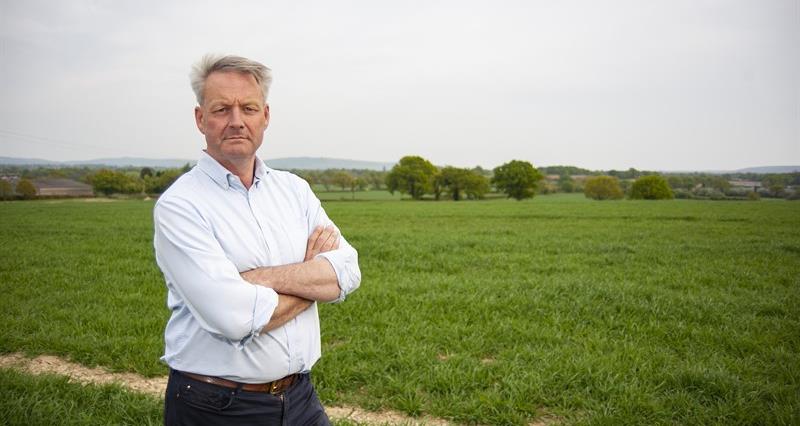David gave evidence to the EFRA Committee alongside George Dunn, Chief Executive Officer of the Tenant Farmers Association and Susan Twining, Chief Land Use Policy Adviser at the CLA (Country Land and Business Association).
David said:
“The phase out of BPS has been clear and ongoing. We’ve had a very rigid timetable for phasing out the new policy, but the phasing in of the new has not kept pace. And unfortunately, combined with the realities of the farm business, events and volatility have made the situation more difficult.
Clarity is key
“We need the certainty of what the SFI can deliver, what it will look like and what money will be available for farmers so they can engage with it.
“Until we can see the bulk of the standards released, that is the point when most farmers will be able to look at SFI, understand what it means to them and then think about how they can adapt their businesses.
Standards offer exciting opportunities
“As a farmer I am quite excited about some of the SFI standards that are going to become available and what they will deliver. We won’t see the true potential of this until it is rolled out.
‚ÄúI would also add that while farmers are facing the volatility of current times, there are bigger things to think about which need to be considered alongside and ELMs, as a policy, doesn‚Äôt touch.‚ÄĚ
ELMs 2022 inquiry
In August we provided a written response to an EFRA Committee inquiry into the development and delivery of ELMs (Environmental Land Management schemes).
This inquiry looked into the government’s progress delivering ELMs and considered whether the scheme’s focus or timescale needs to change. It builds on the 2021 inquiry.
Our response highlights the current challenging market conditions currently facing farmers due to disruption caused by the Ukraine crisis and the global food crisis. Farm input prices are rising at over twice the rate of output prices due to inflationary pressures. Consequently, farmers will focus on their core business first and foremost. They have a moral responsibility to play their part in producing food sustainably.
This is combined with the lack of information available on ELMs for farmers to plan whether to engage. Farmers are making business decisions now, due to Ukraine, market conditions and BPS cuts, yet don’t have enough knowledge of ELMs to know if it could work for their business. This is creating uncertainty for many farm businesses.
Our vision for ELMs
We want an ELMs offer that works for all farm businesses and delivers on the wider agenda of net zero.
The Sustainable Farming Incentive offer needs to be reviewed to ensure there is a comprehensive offer that reduces bureaucracy.
ELMs needs to be a simple scheme that is deliverable alongside farming activities and provides an incentive for taking part.
Ambitious timelines
Based on the information currently available about the Local Nature Recovery and Landscape Recovery schemes, the timelines for wider roll out of these schemes in 2024, seems ambitious.
Our response goes on to highlight the need for tenants and commoners to be able to access these schemes.
Domestic Agricultural Policy
Finally, our response reflects on the NFU’s Domestic Agricultural Policy (2017) proposed framework formed of three distinct constituent parts:
- agricultural productivity measures
- volatility mitigation measures and risk management tools
- environmental measures and incentives
Farm businesses should be able to draw down bespoke assistance from across a range of measures within each of these essential cornerstones.
2021 inquiry into ELMs
In 2021 the NFU submitted evidence to the EFRA Select Committee’s inquiry into the ELMs and the agricultural transition. Deputy President Tom Bradshaw also took part in the committee’s closed roundtable meeting on this topic.
Efra opened an inquiry to assess if the government’s plans were realistic, to look at the support farmers would require throughout the transition, and how the new scheme could be tailored to work for both farmers and the environment.
Key points included:
- Government needs to design a scheme that can be delivered simply, alongside productive business activity, that will secure high uptake delivering a wider range of public goods across the whole landscape. This was outlined in the Sustainable Food and Farming Scheme (SFFS) proposed by farming organisations in 2020
- A highly disruptive lead-up to the agricultural transition has led to disruption in the co-design of schemes and effective, timely communication of the transition plan.
- NFU analysis has shown that the timeline for phasing out direct payments will impact the profitability of farm businesses. Medium-performing farm businesses, on average, would see a 14% reduction in profitability in 2022 with profits reducing 25% by 2023 and over a third (35%) by 2024.
- Ľ ľ“Ľ™»ňappreciates the efforts of Defra to engage with the industry as it develops the ELM.
- When, as planned, ELM is fully available in 2024, continuity and consistency is needed to allow farmers to develop their confidence and trust in the new scheme.
- The scheme must set out clearly the actions required on the ground, the rewards and risks of participation, so a farmer can make an informed business decision whether to engage.
